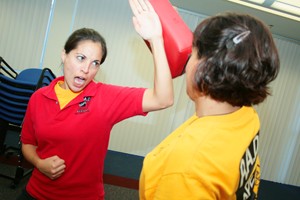Campus Health provided students with self-defense training this weekend as part of its Rape Aggression Defense System, which is offered through its Oasis Program for Sexual Assault and Relationship Violence.
Since 2003, the Oasis Program has offered self-defense training, which teaches women how to protect themselves from sexual assault.
One in four college-age women will be the victim of rape or sexual assault, says Erin Good, a violence prevention specialist at Oasis. Eighty percent of sexual assaults are prompted by someone the victim knows, said Florencia Turco, an instructor in the self-defense program.
People teach children that “”no one has the right to hurt you,”” Turco said, but it should be applied to people of all ages.
Turco and her sister Carla have been instructors since 2005, when they founded the non-profit program Empowering Lives of Latinas in America. The sisters were inspired to teach after they witnessed Tucsonans and people across the nation help their hometown of New Orleans following Hurricane Katrina.
“”We wondered what can we do to give back to Tucson,”” Turco said. “”So we decided, ‘Let’s teach self defense. Let’s teach it in Spanish. Let’s teach it for free.””
On Saturday and Sunday, the Turco sisters led a group of about 20 women in the workshop at the UA.
The participants performed defensive maneuvers, fending off mock attackers. They also engaged in what is called “”simulation,”” where an instructor dresses in a protective suit to enact an attacker.
During the two-day course, the women learned various prevention techniques such as blocking, striking, holds, ground defense and calling attention by vocalizing. But that is only a small portion of what Turco and her sister teach, Turco said.
“”Ninety percent of what we teach is up here,”” Turco said, tapping her temple. “”It’s empowerment. Only 10 percent is physical. If you can use that 90 percent, you don’t even need to touch that 10 percent,”” she said.
During the weekend, students got to know one another and discuss the dangers of sexual assault. Melissa Falls and Suzan Pasch became friends over the weekend and were eating lunch together Sunday afternoon.
“”The class is all girls, so you feel more comfortable,”” Falls said. “”They’re very understanding, so it’s easy to talk to them.””
Pasch agreed. “”It’s cool because you’re supporting one another.””
The women also commented on the ease of taking the class.
“”The instructors are really cool because they’re not your stereotypical defense trainers,”” Pasch said. “”They’re just ordinary women. It helps you understand that any ordinary girl can do defense training.””
Falls added: “”You don’t have to be a strong person either. You can still flip a person off you even if you’re a weakling. It’s all physics.””
Marcia Wong and her daughter Danielle Correia said they have been meaning to take a self-defense class for a long time.
“”It’s awesome; it’s very empowering,”” Wong said. “”I think it should be mandatory for all women.””
“”You should take it regardless of age or profession,”” she added. “”I’m a realtor. Doing open houses – it’s scary when you are by yourself.””
Wong and Correia said that they enjoyed taking the class together. The agreed that above all, the class has pushed them to make themselves more aware of their surroundings.
Awareness is a point that Turco stresses.
“”Women are most vulnerable when they’re plugged into their iPods,”” she said, giving an everyday example. “”It’s when we’re not paying attention that we’re most vulnerable; that can be daytime, nighttime, teatime … it doesn’t matter.””
The Oasis self-defense workshops are held twice a semester and consist of two six-hour sessions. For more information, visit the Oasis portion of the Campus Health Web site at: www.health.arizona.edu/webfiles/hpps_oasis_program.htm









